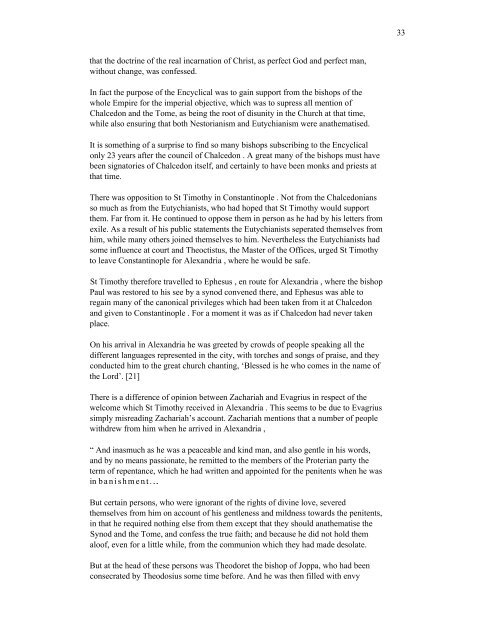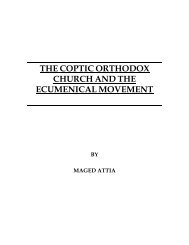Coptic interpretations of the Fourth Ecumenical Council - Saint Mina ...
Coptic interpretations of the Fourth Ecumenical Council - Saint Mina ...
Coptic interpretations of the Fourth Ecumenical Council - Saint Mina ...
You also want an ePaper? Increase the reach of your titles
YUMPU automatically turns print PDFs into web optimized ePapers that Google loves.
that <strong>the</strong> doctrine <strong>of</strong> <strong>the</strong> real incarnation <strong>of</strong> Christ, as perfect God and perfect man,<br />
without change, was confessed.<br />
In fact <strong>the</strong> purpose <strong>of</strong> <strong>the</strong> Encyclical was to gain support from <strong>the</strong> bishops <strong>of</strong> <strong>the</strong><br />
whole Empire for <strong>the</strong> imperial objective, which was to supress all mention <strong>of</strong><br />
Chalcedon and <strong>the</strong> Tome, as being <strong>the</strong> root <strong>of</strong> disunity in <strong>the</strong> Church at that time,<br />
while also ensuring that both Nestorianism and Eutychianism were ana<strong>the</strong>matised.<br />
It is something <strong>of</strong> a surprise to find so many bishops subscribing to <strong>the</strong> Encyclical<br />
only 23 years after <strong>the</strong> council <strong>of</strong> Chalcedon . A great many <strong>of</strong> <strong>the</strong> bishops must have<br />
been signatories <strong>of</strong> Chalcedon itself, and certainly to have been monks and priests at<br />
that time.<br />
There was opposition to St Timothy in Constantinople . Not from <strong>the</strong> Chalcedonians<br />
so much as from <strong>the</strong> Eutychianists, who had hoped that St Timothy would support<br />
<strong>the</strong>m. Far from it. He continued to oppose <strong>the</strong>m in person as he had by his letters from<br />
exile. As a result <strong>of</strong> his public statements <strong>the</strong> Eutychianists seperated <strong>the</strong>mselves from<br />
him, while many o<strong>the</strong>rs joined <strong>the</strong>mselves to him. Never<strong>the</strong>less <strong>the</strong> Eutychianists had<br />
some influence at court and Theoctistus, <strong>the</strong> Master <strong>of</strong> <strong>the</strong> Offices, urged St Timothy<br />
to leave Constantinople for Alexandria , where he would be safe.<br />
St Timothy <strong>the</strong>refore travelled to Ephesus , en route for Alexandria , where <strong>the</strong> bishop<br />
Paul was restored to his see by a synod convened <strong>the</strong>re, and Ephesus was able to<br />
regain many <strong>of</strong> <strong>the</strong> canonical privileges which had been taken from it at Chalcedon<br />
and given to Constantinople . For a moment it was as if Chalcedon had never taken<br />
place.<br />
On his arrival in Alexandria he was greeted by crowds <strong>of</strong> people speaking all <strong>the</strong><br />
different languages represented in <strong>the</strong> city, with torches and songs <strong>of</strong> praise, and <strong>the</strong>y<br />
conducted him to <strong>the</strong> great church chanting, ‘Blessed is he who comes in <strong>the</strong> name <strong>of</strong><br />
<strong>the</strong> Lord’. [21]<br />
There is a difference <strong>of</strong> opinion between Zachariah and Evagrius in respect <strong>of</strong> <strong>the</strong><br />
welcome which St Timothy received in Alexandria . This seems to be due to Evagrius<br />
simply misreading Zachariah’s account. Zachariah mentions that a number <strong>of</strong> people<br />
withdrew from him when he arrived in Alexandria ,<br />
“ And inasmuch as he was a peaceable and kind man, and also gentle in his words,<br />
and by no means passionate, he remitted to <strong>the</strong> members <strong>of</strong> <strong>the</strong> Proterian party <strong>the</strong><br />
term <strong>of</strong> repentance, which he had written and appointed for <strong>the</strong> penitents when he was<br />
in banishment...<br />
But certain persons, who were ignorant <strong>of</strong> <strong>the</strong> rights <strong>of</strong> divine love, severed<br />
<strong>the</strong>mselves from him on account <strong>of</strong> his gentleness and mildness towards <strong>the</strong> penitents,<br />
in that he required nothing else from <strong>the</strong>m except that <strong>the</strong>y should ana<strong>the</strong>matise <strong>the</strong><br />
Synod and <strong>the</strong> Tome, and confess <strong>the</strong> true faith; and because he did not hold <strong>the</strong>m<br />
alo<strong>of</strong>, even for a little while, from <strong>the</strong> communion which <strong>the</strong>y had made desolate.<br />
But at <strong>the</strong> head <strong>of</strong> <strong>the</strong>se persons was Theodoret <strong>the</strong> bishop <strong>of</strong> Joppa, who had been<br />
consecrated by Theodosius some time before. And he was <strong>the</strong>n filled with envy<br />
33








